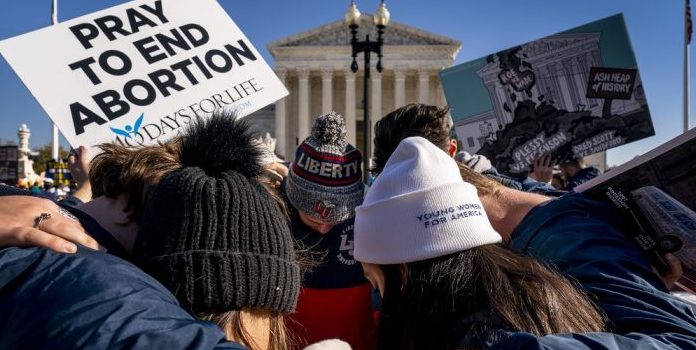(Headline USA) The Supreme Court ruled Friday that Texas abortion providers can sue over the state’s ban on most abortions, but the justices are allowing the law to remain in effect.
The court acted more than a month after hearing arguments over the law that makes abortion illegal after cardiac activity is detected in an embryo. There are no exceptions for rape or incest.
The law has been in place since Sept. 1.
The same far-left federal judge who already has once blocked the law almost certainly will be asked to do so again. But then his decision will be reviewed by the 5th U.S. Circuit Court of Appeals, which has twice voted to allow enforcement of the abortion ban.
The case could return to the justices, and so far there have not been five votes on the nine-member court to put the law on hold while the legal fight plays out.
The court’s narrow conservative majority also seems likely to side with pro-lifers in a Mississippi case that was argued last week, although that decision is not expected until the spring.
The high court ruling came a day after a state court judge in Texas ruled that the law’s enforcement, which rewards lawsuits against violators by awarding judgments of $10,000, is unconstitutional yet left the law in place.
The vote was 8 to 1 in favor of allowing the lawsuit to proceed, with only Justice Clarence Thomas voting the other way.
The abortionists’ plan of attack over the Texas law is focused on its unusual structure and whether it improperly limits how the law can be challenged in court.
While the state itself is bound by the controversial Roe vs. Wade decision and others applicable under federal law, Texas lawmakers delegated the power for suing to private citizens, rather than state officials.
The law authorizes lawsuits against clinics, doctors and anyone who “aids or abets” an abortion performed after cardiac activity is detected.
The case raised a complex set of issues about who, if anyone, can sue over the law in federal court, the typical route for challenges to abortion restrictions. Indeed, federal courts routinely put a hold on similar laws, which rely on traditional enforcement by state and local authorities.
The Supreme Court itself has often skirted controversial issues—such as gerrymandering and vote fraud during the 2020 election—by simply determining a lack of standing for the plaintiffs rather than issuing a ruling.
The court was divided 5-4, with conservatives in the majority, on another knotty issue, whom to target with a court order that ostensibly tries to block the law. The court ruled that Texas licensing officials may be sued, but dismissed claims against state court judges, court clerks and Attorney General Ken Paxton.
Centrist Chief Justice John Roberts and the three other left-leaning justices dissented from that part of the decision in an opinion that said the purpose of the Texas law was “to nullify this court’s rulings” on abortion.
“The nature of the federal right infringed does not matter; it is the role of the Supreme Court in our constitutional system that is at stake,” Roberts wrote.
In a separate opinion, far-left Justice Sonia Sotomayor chastised her colleagues for what she said was “delay” in the case that has had “catastrophic consequences for women seeking to exercise their constitutional right to an abortion in Texas.”
She said the court’s decision closed off the most direct route to challenging the law and would “clear the way” for other states to “reprise and perfect Texas’ scheme in the future to target the exercise of any right recognized by this court with which they disagree.”
In the law’s month of operation, a study published by researchers at the University of Texas found that the number of abortions statewide fell by 50% compared with September 2020.
The study was based on data from 19 of the state’s 24 abortion clinics, according to the Texas Policy Evaluation Project.
Texas residents who left the state seeking an abortion also have had to travel well beyond neighboring states, where clinics cannot keep up with the increase in patients from Texas, according to a separate study by the Guttmacher Institute.
The justices declined to block the law once before, voting 5-4 in September to let it take effect.
Following the September vote, the politically compromised Justice Department filed its own lawsuit over the Texas law. The justices on Friday dismissed that suit.
Adapted from reporting by the Associated Press

